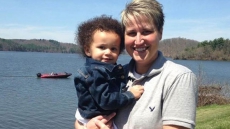NEW YORK — There's a difference in parenting between a little backtalk and kids actually bullying their grown-ups.
Yes, you heard that right. Parent and family therapist Sean Grover writes in a new book, "When Kids Call the Shots," that a generation or two ago, it would have been unthinkable for children to bully their parents without consequences, yet today everyone knows a parent who is bullied.
By that he means the terrible twos that turn into the terrible tweens that turn into the terrible teens that become the terrible college years.
Turning that around, he said in a recent interview, means coming up with new strategies but also unpacking your own baggage in the esteem, resentment, shame, fear and anxiety compartments of your past. It ain't pretty but letting go of old tactics — surrendering, punishing, negotiating — is a positive step.
Grover, in Manhattan, offers readable bites of advice, case studies from his 20 years working with families and personal stories of his own trials as the father of two girls, now 12 and 15.
While parent bullying can occur at younger ages, he focuses on adolescents as he urges parents to end patterns of unhealthy conflict, caving to bullying or bullying back. His tips cover both parents and their kids, including better vigilance of possible auditory processing disorders, dyslexia and other undiagnosed issues that may affect learning and behaviour, and may up anxiety, frustration and anger all around.
The book, from AMACOM, the publishing arm of the American Management Association, was released in early June. A conversation with Sean Grover:
AP: How does this kind of bullying begin?
Grover: It's been around a long time in child development, really, but it just didn't have that name. The prime reason for it is a backlash against the authoritative parenting of the past. People make these vows that they're never going to be that punishing or that way with their kids. Today parents go too far in the other direction. They want to be their kids' friends, they're afraid of their children, of losing their child's affection.
It's not unusual for a guidance counsellor or a school psychologist to take me aside when I'm doing a workshop and say, 'This is a huge problem we don't know how to address.' Children are bullying their parents and they bring that culture into the classroom with their peers or their teacher.
AP: Are these behaviours out of control?
Grover: What has changed are the parenting models, how people are responding to their children. A lot of parents come to me burned out, or their relationships are really on the rocks. They begin to relive their own childhood in some way, so it's a mess of internal space that's hard to navigate.
The difference is not that child development has changed but the evolution of parenting.
AP: So there's more guilt-prone, anxiety-fueled, fix-everything parenting today? Are we failing by allowing ourselves to be bullied?
Grover: Absolutely there's more. I think we may be stumbling. I'm not sure about failing.
You get into a strange situation where the less parents provide things like structure and boundaries, like in the past, the more kids begin to act up. They're unconsciously waving flags: 'Will you do something over here, please?' It's this crazy dance where kids will push their parents until they set a limit and once they do, things settle down quickly.
AP: How do we reclaim our parent power?
Grover: So often we treat parenting as one size fits all. Strategies usually begin by going backward. Rather than trying to snuff out the problem, what's causing the problem? Rather than trying to control a conflict or control a situation, look at the whole child and find what's missing.
AP: You've spoken about your own struggles as a parent.
Grover: When my oldest daughter was about 6 she'd have these horrific temper tantrums, meltdowns, screaming. I was at a New Year's Day celebration and she was making such a scene. Being a therapist, I was dying a million deaths. She was screaming, running away from me, telling me to shut up. And when I went home, I looked at my parenting books and I just wanted to throw all of them out the window. They were just so generic. It was as if one parenting script fits all cultures.
In my book, really I'm asking parents to consider their history, their culture, their upbringing. What kind of parenting did they get, what were their parents' light qualities, what were their dark qualities? To crawl inside that and have them come to some realization of where they come from, where they are and where they want to go as a parent.
I went to go see a parenting specialist and paid him a lot of money. We had been doing all the usual parent things, you know, punishments, consequences, making lists, and it was like running a prison. It was so miserable.
The parenting expert said I want you to have breakfast with your daughter three times a week. I was like what? And he said during that time you do not talk about yourself, you do not offer any advice, criticisms, you don't tell stories. You just give yourself completely to her.
I was so desperate at that point and we went to a restaurant and she just devoured that level of attention. She was a pure delight to be with. It triggered a maturing process.
So on a trip later to Maine she had a meltdown and we talked and finally it came out. She bursts out crying: 'You love my sister more than me.' I always shudder to think, had I not taken this route, if I would have gone through punishing and consequences, I probably would have won the battle but I would have lost my daughter.





